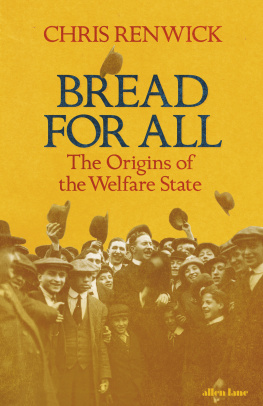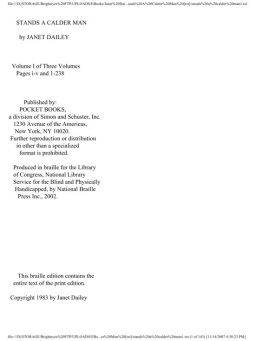Changing Directions of the British Welfare State
Changing Directions of the British Welfare State
Edited by
Gideon Calder, Jeremy Gass
and Kirsten Merrill-Glover
The Contributors, 2012
All rights reserved. No part of this book may be reproduced in any material form (including photocopying or storing it in any medium by electronic means and whether or not transiently or incidentally to some other use of this publication) without the written permission of the copyright owner except in accordance with the provisions of the Copyright, Designs and Patents Act 1988. Applications for the copyright owners written permission to reproduce any part of this publication should be addressed to the University of Wales Press, 10 Columbus Walk, Brigantine Place, Cardiff CF10 4UP.
www.uwp.co.uk
British Library Cataloguing-in-Publication Data
A catalogue record for this book is available from the British Library.
ISBN9780708325469
e-ISBN9781783165513
The right of the Contributors to be identified as authors of this work has been asserted by them in accordance with sections 77 and 79 of the Copyright, Designs and Patents Act 1988.
Huw Edwards
I was delighted when approached by the University of Wales, Newport to write a foreword to this publication. The welfare state is something that the British public has always been proud of and, indeed, it has been the envy of other countries throughout the world.
In 1942, William Beveridge (18791963) published his report on the way forward for Britain after the Second World War. Beveridges report identified five giant evils that were prevalent at that time Want, Disease, Ignorance, Squalor and Idleness. These are addressed in the first part of the book. The year 1945 brought about a tremendous change in government policy when Winston Churchills Conservative Party was defeated by a Labour Party headed by Clement Attlee. In 1948, Beveridges welfare state was established with the key elements of social security; health; housing; education and social services (welfare and children). What a tremendous legacy for both Beveridge and Attlee, and, of course, Aneurin Bevan (minister of health at that time) who was tasked with the operational details.
For more than sixty years you and I have benefited from living in a welfare state. In that period of time other challenges have evolved in areas such as gender, ethnicity, disability, devolution and the start and end of life. These are debated in the second part of this publication.
Alongside this publication, the university organised a series of public lectures and debates, various film projects, and at the heart of the project was a website providing a forum for the sharing of views, perceptions and for critical debate.
I am sure that this publication will provide an excellent reference on a wide-ranging and accessible set of reflections on the past, present and future of welfare provision in Britain.
The editors would like to thank the contributors to this book for their commitment to it amid the usual array of hurdles and distractions and some tricky personal challenges. We would also like to thank our colleagues on the Welfare State 2008 project, and all of those who contributed to its vibrancy in one way or another, via submissions to the website, contributions to events or encouraging it along in other ways. We owe particular gratitude to Matthew Evans for the energy he invested in the project during his time at the Community University of the Valleys (East), and to Scott Hazell for his invaluable work on the IT side.
Gideon Calder dedicates his share of the book to the memory of his father Angus, who was born in the year of the Beveridge Report, died a month before the sixtieth anniversary of the National Health Service, and whose writings, in different ways and registers, echo many of this books concerns.
Jeremy Gass dedicates his share of the book to Katrina, who was born in the year of the National Health Act, and their daughter Beth, one of Thatchers children, both of whom work in different ways for social justice and womens rights.
Kirsten Merrill-Glover dedicates her share of the book to the memory of her brother Karl, a proponent and defender of welfare service provision, and to her sons Nye and Billy whose generation holds the future of the British welfare state.
CONTENTS
Huw Edwards
Gideon Calder, Jeremy Gass and Kirsten Merrill-Glover
Peter Kenway
Michael Sullivan
Gareth Rees
John Puzey
David Byrne
Sandra Shaw
Charlotte Williams
Steven R. Smith
Mark Drakeford
Ian Butler
Liz Lloyd
Victoria Winckler
Ian Butler is a qualified social worker. Formerly Professor of Social Work at Keele University and Visiting Professor in the Department of Child Health at the University of Wales College of Medicine, he is Professor of Social Work at Bath University. In 2005, he was seconded to the Welsh Assembly Government where he was a special advisor to the first minister until 2012. He is an Honorary Member of the Council of the NSPCC and was elected to the Academy of Social Sciences in 2004. In 2009, he was appointed to the Board of Cafcass (England). He has published widely on social work policy and practice with children and families.
David Byrne is Professor of Sociology and Social Policy at Durham University. His main interests include methods for understanding complex systems, and the nature of post-industrial societies. Among his publications are Social Exclusion (2nd edn, Open University Press, 2005), and, edited with Charles Ragin, The Sage Handbook of Case Based Methods (Sage, 2009).
Gideon Calder is Reader in Ethics and Social Philosophy at University of Wales, Newport and Director of the Newport Social Ethics Research Group. He has a special interest in the application of social, ethical and political theory to issues of pressing contemporary social concern and recent published work has addressed a range of such contexts, including environmental politics, citizenship, the normative justification of European Union institutions and the ethics of sporting boycotts. He is currently president of the UK Association for Legal and Social Philosophy.
Mark Drakeford is Assembly Member for Cardiff West. Previously he was Professor of Social Policy and Applied Social Sciences at Cardiff University. Between 2000 and 2009 he was the Cabinets special adviser on health and social policy at the Welsh government.
Jeremy Gass is a visiting lecturer at the University of Wales, Newport, where he was formerly Head of Community Learning. Previously, he was a social worker and welfare rights worker before becoming a tutor/organiser with the Workers Educational Association in south Wales. He has recently completed doctoral research in adult education and active citizenship.
Peter Kenway is Director and co-founder of the New Policy Institute (NPI), an independent think tank focusing on evidence-based analysis of social justice issues. Formerly an economist at the University of Reading, he has also worked as a manager, consultant and planner in public transport. Recent work by the NPI has included a 2011 report produced with the Bevan Foundation and the Equalities and Human Rights Commission, bringing together data on inequalities between different groups, and how these inequalities differ between England and Wales.













